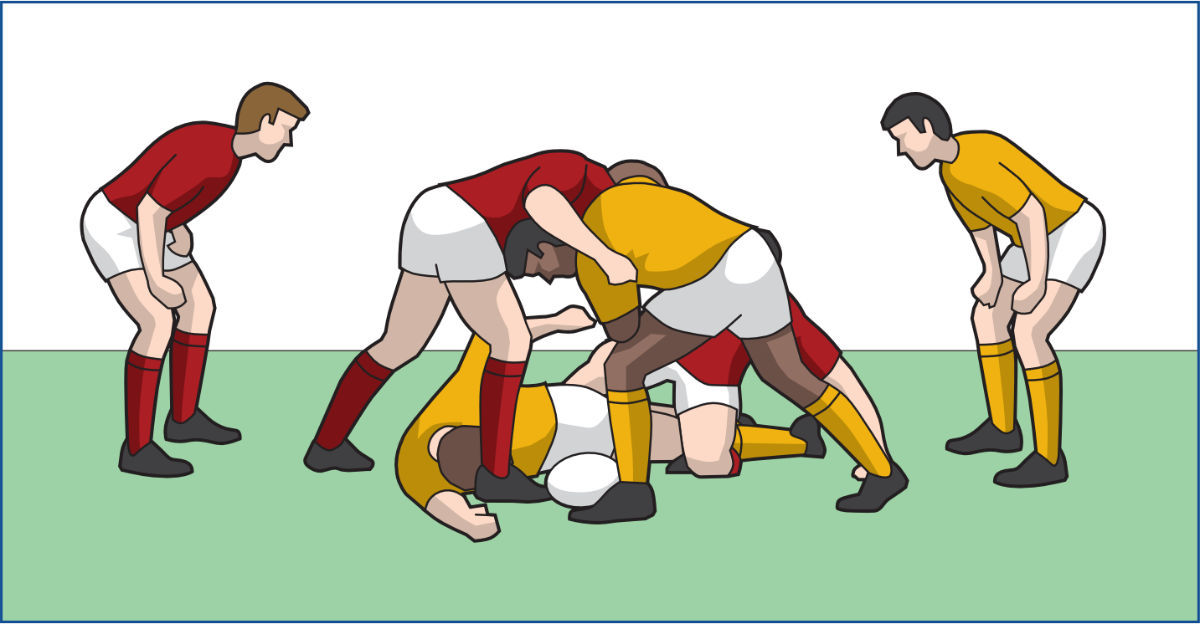Rugby is well-liked in the United States, but it is particularly well-known in Europe and some regions of Australia. According to legend, rugby began in 1823 at a school in Warwickshire, England. Because William Webb Ellis was the creator, the World Cup Trophy bears his name.
Rugby is a team sport with two teams of fifteen players each. To get as many points as possible, each team can carry, pass, or kick the ball to the goal area. We here wish to discuss general rules of rugby today.
What are the general rules of rugby?
1. Respect Your Opponents
Rugby is a very competitive sport that involves a lot of physical contact. The identical goal that your opponent and you share is winning. Sadly, only one squad will prevail. It may annoy you when an opponent plays extremely aggressively. You must maintain your composure and refrain from acting uncivilly.

In the excitement of a rugby match, you also don’t want to insult your opponents because that could escalate to physical contact. Additionally, if you spew trash and then your opponent dominates you, you will appear rather foolish. You definitely do not need to be best buddies with your opponent because it is a competition. However, you must acknowledge and embrace them after a tough match and treat them like human beings.
2. Respect the Referee
Rugby is fiercely competitive, and if a mistake call is made in the heat of the moment, people may lose their cool. Even if it happens frequently, it’s crucial to try to keep your cool and not vent your frustration on the referee. The referee probably realizes he made the incorrect call and wishes he had the opportunity to correct it. The next close call may go in your team’s favor if you respond calmly, according to some referees.
3. Avoid Foul Play
Rugby involves a great deal of physical contact. That does not imply that all forms of physical touch are acceptable. Foul play is prohibited includes punching, elbowing, kicking, headbutting, and tripping.

A variety of dangers can result from foul play. It is prohibited to tackle or push a player who is in the air or who is not in possession of the ball. Additionally, you are not allowed to attempt to kick the ball out of the ball carrier’s hands because doing so puts your opponent at risk of getting hurt. This is one of the important general rules of rugby.
Penalties and occasionally ejection are consequences for misconduct. The referee will show a player a yellow card and suspend them for ten minutes if they are being warned for rough play. The player will be removed from the game and not be permitted to return if they receive another penalty. Foul play will significantly reduce your team’s chances of winning because the player won’t be replaced and will be unavailable for the rest of the game.
4. Make Sure To Pass Properly
There is a specific passing style in rugby that you must adhere to. Unlike in most American sports, throwing overhand is not permitted. Rugby offers a wide variety of passing methods.

Rugby passes are made by moving two hands across the front of your body. Spin can also be used to increase the distance of the pass.
Any rugby player knows the importance of passing, and it will be difficult for them to succeed without it. It’s also forbidden to pass the ball to a teammate in the forward direction. You must be looking for a teammate who is either behind you or by your side if you want to pass the ball to him.
5. Understand the Structure of the Game
When you are preparing to begin a game, it is crucial to understand how it will be played.
Rugby has two 40-minute sessions, one after the other. There will be a maximum 10 minute intermission between each half before the teams switch ends.
A coin flip is conducted prior to kickoff to decide who will start the game. A place kick or a drop kick from the middle of the halfway line initiates the game. On kickoff, the ball must travel at least ten meters. In the event that it doesn’t, the opposition team will be given the option of a scrum or line-out by the midway point. Play is restarted with a drop kick from the halfway line when penalties or drop goals are scored during the course of the match. The kick is made by the team that has given up the points.
6. Understand the Ruck and Maul

Two key components of the general rules of rugby are the ruck and the maul, but there are variances between the two that you must be aware of.
When a player is tackled and falls to the ground instantly, a ruck occurs. The ball carrier must instantly release the ball, and if it stays in play, a race ensues to determine who can seize control. Both teams must attempt to drive over the ball to create space for their teammates. The team the referee believed had more forward momentum in the ruck will probably win a scrum after about five seconds.
Similar to a maul, only the ball-carrier stays upright, allowing his teammates to tie on and push their opponents back. The ball carrier and one player from each team usually start the maul with roughly three men total. However, the player mound can grow to include 10 or more players. Mauls are frequently used to secure a try when they are close to the try line. Even though these two plays are straightforward, it’s crucial to recognize how they differ from one another.
9. Respect the A League’s drug policy
Sports leagues, both professional and amateur, almost universally have drug rules. Sports are heavily reliant on performance-enhancing substances, which are officially forbidden for a number of reasons.
Sometimes, athletes will utilize medicines like steroids in the hopes of improving their performance. They will have an unfair competitive edge over players that play within the rules as a result of this. They are not only prohibited, but also dangerous. These drugs have a lot of side effects, which is one of the main reasons they are illegal. When you use performance-enhancing drugs, you endanger your own safety and the fairness of the game.
10. Have fun

The last and important is that Rugby is no exception to the rule that sports should be enjoyable. Whenever you play rugby, strive to always make sure you are having fun. Try to recall your initial motivation for taking the field if you are losing or performing poorly. Sometimes it can be difficult to remain upbeat when you are being crushed, but having a “glass half full” attitude will help you and might even improve your performance. Your teammates and those around you will also enjoy themselves when you are having a good time. Rugby is fiercely competitive, but having fun should come first just as much as winning.
Conclusion
By the way, we have finished this interesting article on the general rules of rugby, thanks for reading.
Please read: http://rugbyqa.com/the-3-fun-games-with-rugby-for-kids/

